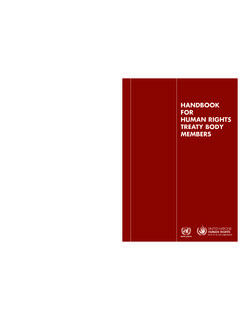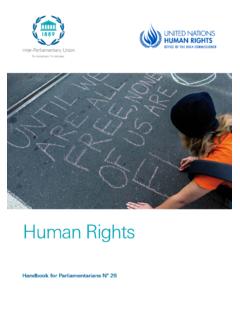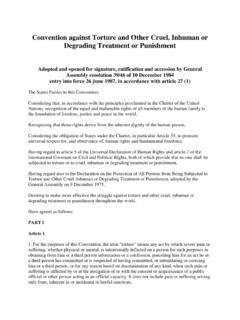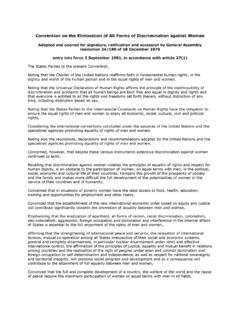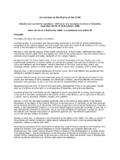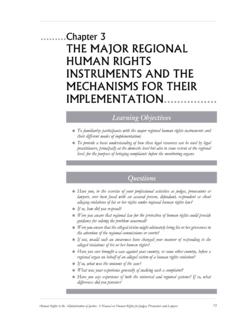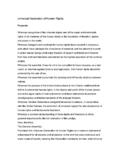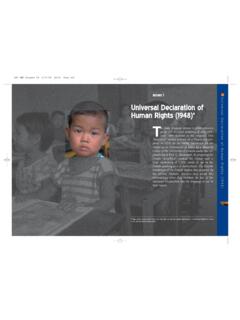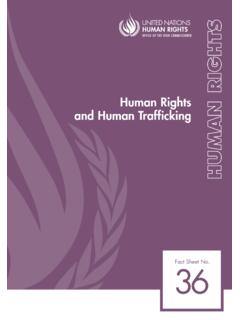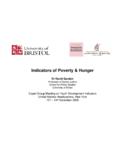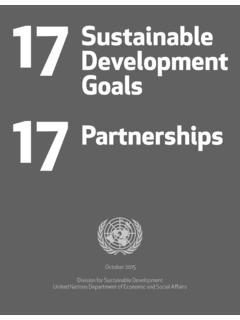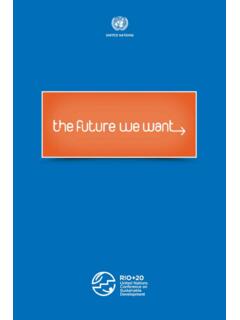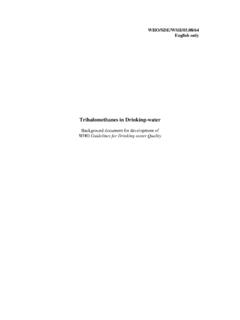Transcription of Vienna Declaration and Programme of Action
1 Vienna Declaration and Programme of Action Adopted by the World Conference on Human Rights in Vienna on 25 June 1993 The World Conference on Human Rights , Considering that the promotion and protection of human rights is a matter of priority for the international community, and that the Conference affords a unique opportunity to carry out a comprehensive analysis of the international human rights system and of the machinery for the protection of human rights, in order to enhance and thus promote a fuller observance of those rights, in a just and balanced manner, Recognizing and affirming that all human rights derive from the dignity and worth inherent in the human person, and that the human person is the central subject of human rights and fundamental freedoms, and consequently should be the principal beneficiary and should participate actively in the realization of these rights and freedoms, Reaffirming their commitment to the purposes and principles contained in the Charter of the united nations and the Universal Declaration of Human Rights, Reaffirming the commitment contained in Article 56 of the Charter of the united nations to take joint and separate Action , placing proper emphasis on developing effective international cooperation for the realization of the purposes set out in Article 55, including universal respect for, and observance of, human rights and fundamental freedoms for all, Emphasizing the responsibilities of all States, in conformity with the Charter of the united nations , to develop and encourage respect for human rights and fundamental freedoms for all.
2 Without distinction as to race, sex, language or religion, Recalling the Preamble to the Charter of the united nations , in particular the determination to reaffirm faith in fundamental human rights, in the dignity and worth of the human person, and in the equal rights of men and women and of nations large and small, Recalling also the determination expressed in the Preamble of the Charter of the united nations to save succeeding generations from the scourge of war, to establish conditions under which justice and respect for obligations arising from treaties and other sources of international law can be maintained, to promote social progress and better standards of life in larger freedom, to practice tolerance and good neighbourliness, and to employ international machinery for the promotion of the economic and social advancement of all peoples, Emphasizing that the Universal Declaration of Human Rights, which constitutes a common standard of achievement for all peoples and all nations , is the source of inspiration and has been the basis for the united nations in making advances in standard setting as contained in the existing international human rights instruments, in particular the International Covenant on Civil and Political Rights and the International Covenant on Economic, social and Cultural Rights, Considering the major changes taking place on the international scene and the aspirations of all the peoples for an international order based on the principles enshrined in the Charter of the united nations , including promoting and encouraging respect for human rights and fundamental freedoms for all and respect for the principle of equal rights and self-determination of peoples.
3 Peace, democracy, justice, equality, rule of law, pluralism, development , better standards of living and solidarity, Deeply concerned by various forms of discrimination and violence, to which women continue to be exposed all over the world, Recognizing that the activities of the united nations in the field of human rights should be rationalized and enhanced in order to strengthen the united nations machinery in this field and to further the objectives of universal respect for observance of international human rights standards, 2 Having taken into account the Declarations adopted by the three regional meetings at Tunis, San Jos and Bangkok and the contributions made by Governments, and bearing in mind the suggestions made by intergovernmental and non-governmental organizations, as well as the studies prepared by independent experts during the preparatory process leading to the World Conference on Human Rights, Welcoming the International Year of the World's Indigenous People 1993 as a reaffirmation of the commitment of the international community to ensure their enjoyment of all human rights and fundamental freedoms and to respect the value and diversity of their cultures and identities, Recognizing also that the international community should devise ways and means to remove the current obstacles and meet challenges to the full realization of all human rights and to prevent the continuation of human rights violations resulting therefrom throughout the world.
4 Invoking the spirit of our age and the realities of our time which call upon the peoples of the world and all States Members of the united nations to rededicate themselves to the global task of promoting and protecting all human rights and fundamental freedoms so as to secure full and universal enjoyment of these rights, Determined to take new steps forward in the commitment of the international community with a view to achieving substantial progress in human rights endeavours by an increased and sustained effort of international cooperation and solidarity, Solemnly adopts the Vienna Declaration and Programme of Action . I 1. The World Conference on Human Rights reaffirms the solemn commitment of all States to fulfil their obligations to promote universal respect for, and observance and protection of, all human rights and fundamental freedoms for all in accordance with the Charter of the united nations , other instruments relating to human rights, and international law.
5 The universal nature of these rights and freedoms is beyond question. In this framework, enhancement of international cooperation in the field of human rights is essential for the full achievement of the purposes of the united nations . Human rights and fundamental freedoms are the birthright of all human beings; their protection and promotion is the first responsibility of Governments. 2. All peoples have the right of self-determination. By virtue of that right they freely determine their political status, and freely pursue their economic, social and cultural development . Taking into account the particular situation of peoples under colonial or other forms of alien domination or foreign occupation, the World Conference on Human Rights recognizes the right of peoples to take any legitimate Action , in accordance with the Charter of the united nations , to realize their inalienable right of self-determination.
6 The World Conference on Human Rights considers the denial of the right of self-determination as a violation of human rights and underlines the importance of the effective realization of this right. In accordance with the Declaration on Principles of International Law concerning Friendly Relations and Cooperation Among States in accordance with the Charter of the united nations , this shall not be construed as authorizing or encouraging any Action which would dismember or impair, totally or in part, the territorial integrity or political unity of sovereign and independent States conducting themselves in compliance with the principle of equal rights and self-determination of peoples and thus possessed of a Government representing the whole people belonging to the territory without distinction of any kind. 33. Effective international measures to guarantee and monitor the implementation of human rights standards should be taken in respect of people under foreign occupation, and effective legal protection against the violation of their human rights should be provided, in accordance with human rights norms and international law, particularly the Geneva Convention relative to the Protection of Civilian Persons in Time of War, of 14 August 1949, and other applicable norms of humanitarian law.
7 4. The promotion and protection of all human rights and fundamental freedoms must be considered as a priority objective of the united nations in accordance with its purposes and principles, in particular the purpose of international cooperation. In the framework of these purposes and principles, the promotion and protection of all human rights is a legitimate concern of the international community. The organs and specialized agencies related to human rights should therefore further enhance the coordination of their activities based on the consistent and objective application of international human rights instruments. 5. All human rights are universal, indivisible and interdependent and interrelated. The international community must treat human rights globally in a fair and equal manner, on the same footing, and with the same emphasis. While the significance of national and regional particularities and various historical, cultural and religious backgrounds must be borne in mind, it is the duty of States, regardless of their political, economic and cultural systems, to promote and protect all human rights and fundamental freedoms.
8 6. The efforts of the united nations system towards the universal respect for, and observance of, human rights and fundamental freedoms for all, contribute to the stability and well-being necessary for peaceful and friendly relations among nations , and to improved conditions for peace and security as well as social and economic development , in conformity with the Charter of the united nations . 7. The processes of promoting and protecting human rights should be conducted in conformity with the purposes and principles of the Charter of the united nations , and international law. 8. Democracy, development and respect for human rights and fundamental freedoms are interdependent and mutually reinforcing. Democracy is based on the freely expressed will of the people to determine their own political, economic, social and cultural systems and their full participation in all aspects of their lives.
9 In the context of the above, the promotion and protection of human rights and fundamental freedoms at the national and international levels should be universal and conducted without conditions attached. The international community should support the strengthening and promoting of democracy, development and respect for human rights and fundamental freedoms in the entire world. 9. The World Conference on Human Rights reaffirms that least developed countries committed to the process of democratization and economic reforms, many of which are in Africa, should be supported by the international community in order to succeed in their transition to democracy and economic development . 10. The World Conference on Human Rights reaffirms the right to development , as established in the Declaration on the Right to development , as a universal and inalienable right and an integral part of fundamental human rights.
10 As stated in the Declaration on the Right to development , the human person is the central subject of development . While development facilitates the enjoyment of all human rights, the lack of development may not be invoked to justify the abridgement of internationally recognized human rights. States should cooperate with each other in ensuring development and eliminating obstacles to development . The international community should promote an effective international cooperation for the realization of the right to development and the elimination of obstacles to development . 4 Lasting progress towards the implementation of the right to development requires effective development policies at the national level, as well as equitable economic relations and a favourable economic environment at the international level. 11. The right to development should be fulfilled so as to meet equitably the developmental and environmental needs of present and future generations.
